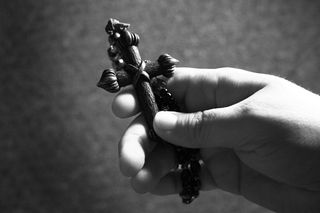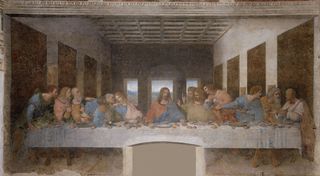The Surprising Origins of 9 Common Superstitions
Intro

Some superstitions are so ingrained in modern English-speaking societies that everyone, from lay people to scientists, succumb to them (or, at least, feel slightly uneasy about not doing so). But why don't we walk under ladders? Why, after voicing optimism, do we knock on wood? Why do nonreligious people "God bless" a sneeze? And why do we avoid at all costs opening umbrellas indoors?
Find out the origins of all these familiar customs, and more.
"It's bad luck to open an umbrella indoors."

Though some historians tentatively trace this belief back to ancient Egyptian times, the superstitions that surrounded pharaohs' sunshades were actually quite different and probably unrelated to the modern-day one about raingear. Most historians think the warning against unfurling umbrellas inside originated much more recently, in Victorian England.
In "Extraordinary Origins of Everyday Things" (Harper, 1989), the scientist and author Charles Panati wrote: "In eighteenth-century London, when metal-spoked waterproof umbrellas began to become a common rainy-day sight, their stiff, clumsy spring mechanism made them veritable hazards to open indoors. A rigidly spoked umbrella, opening suddenly in a small room, could seriously injure an adult or a child, or shatter a frangible object. Even a minor accident could provoke unpleasant words or a minor quarrel, themselves strokes of bad luck in a family or among friends. Thus, the superstition arose as a deterrent to opening an umbrella indoors."
"It's bad luck to walk under a leaning ladder."

This superstition really does originate 5,000 years ago in ancient Egypt. A ladder leaning against a wall forms a triangle, and Egyptians regarded this shape as sacred (as exhibited, for example, by their pyramids). To them, triangles represented the trinity of the gods, and to pass through a triangle was to desecrate them.
This belief wended its way up through the ages. "Centuries later, followers of Jesus Christ usurped the superstition, interpreting it in light of Christ's death," Panati explained. "Because a ladder had rested against the crucifix, it became a symbol of wickedness, betrayal, and death. Walking under a ladder courted misfortune."
In England in the 1600s, criminals were forced to walk under a ladder on their way to the gallows.
"A broken mirror gives you seven years of bad luck."

In ancient Greece, it was common for people to consult "mirror seers," who told their fortunes by analyzing their reflections. As the historian Milton Goldsmith explained in his book "Signs, Omens and Superstitions" (1918), "divination was performed by means of water and a looking glass. This was called catoptromancy. The mirror was dipped into the water and a sick person was asked to look into the glass. If his image appeared distorted, he was likely to die; if clear, he would live."
In the first century A.D., the Romans added a caveat to the superstition. At that time, it was believed that peoples' health changed in seven year cycles . A distorted image resulting from a broken mirror therefore meant seven years of ill-health and misfortune, rather than outright death.
"When you spill salt, toss some over your left shoulder to avoid bad luck."

Spilling salt has been considered unlucky for thousands of years. Around 3,500 B.C., the ancient Sumerians first took to nullifying the bad luck of spilled salt by throwing a pinch of it over their left shoulders. This ritual spread to the Egyptians, the Assyrians and later, the Greeks.
The superstition ultimately reflects how much people prized (and still prize) salt as a seasoning for food. The etymology of the word "salary" shows how highly we value it. According to Panati: "The Roman writer Petronius, in the Satyricon, originated 'not worth his salt' as opprobrium for Roman soldiers, who were given special allowances for salt rations, called salarium 'salt money' the origin of our word 'salary.'"
"Knock on wood to prevent disappointment."

Though historians say this may be one of the most prevalent superstitious customs in the United States, its origin is very much in doubt. "Some attribute it to the ancient religious rite of touching a crucifix when taking an oath," Goldsmith wrote. Alternatively, "among the ignorant peasants of Europe it may have had its beginning in the habit of knocking loudly to keep out evil spirits."
"Always 'God bless' a sneeze."

In most English-speaking countries, it is polite to respond to another person's sneeze by saying "God bless you." Though incantations of good luck have accompanied sneezes across disparate cultures for thousands of years (all largely tied to the belief that sneezes expelled evil spirits), our particular custom began in the sixth century A.D. by explicit order of Pope Gregory the Great.
A terrible pestilence was spreading through Italy at the time. The first symptom was severe, chronic sneezing, and this was often quickly followed by death. [Is It Safe to Hold In a Sneeze? ]
Pope Gregory urged the healthy to pray for the sick, and ordered that light-hearted responses to sneezes such as "May you enjoy good health" be replaced by the more urgent "God bless you!" If a person sneezed when alone, the Pope recommended that they say a prayer for themselves in the form of "God help me!"
"Hang a horseshoe on your door open-end-up for good luck."

The horseshoe is considered to be a good luck charm in a wide range of cultures. Belief in its magical powers traces back to the Greeks, who thought the element iron had the ability ward off evil. Not only were horseshoes wrought of iron, they also took the shape of the crescent moon in fourth century Greecefor the Greeks, a symbol of fertility and good fortune.
The belief in the talismanic powers of horseshoes passed from the Greeks to the Romans, and from them to the Christians. In the British Isles in the Middle Ages, when fear of witchcraft was rampant, people attached horseshoes open-end-up to the sides of their houses and doors. People thought witches feared horses, and would shy away from any reminders of them.
"A black cat crossing your path is lucky/unlucky."

Many cultures agree that black cats are powerful omens but do they signify good or evil?
The ancient Egyptians revered all cats, black and otherwise, and it was there that the belief began that a black cat crossing your path brings good luck. Their positive reputation is recorded again much later, in the early seventeenth century in England: King Charles I kept (and treasured) a black cat as a pet. Upon its death, he is said to have lamented that his luck was gone. The supposed truth of the superstition was reinforced when he was arrested the very next day and charged with high treason.
During the Middle Ages, people in many other parts of Europe held quite the opposite belief. They thought black cats were the "familiars," or companions, of witches, or even witches themselves in disguise, and that a black cat crossing your path was an indication of bad luck a sign that the devil was watching you. This seems to have been the dominant belief held by the Pilgrims when they came to America, perhaps explaining the strong association between black cats and witchcraft that exists in the country to this day.
"The number 13 is unlucky."

Fear of the number 13, known as "triskaidekaphobia," has its origins in Norse mythology. In a well-known tale, 12 gods were invited to dine at Valhalla, a magnificent banquet hall in Asgard, the city of the gods. Loki, the god of strife and evil, crashed the party, raising the number of attendees to 13. The other gods tried to kick Loki out, and in the struggle that ensued, Balder, the favorite among them, was killed.
Scandinavian avoidance of 13-member dinner parties, and dislike of the number 13 itself, spread south to the rest of Europe. It was reinforced in the Christian era by the story of the Last Supper, at which Judas, the disciple who betrayed Jesus, was the thirteenth guest at the table.
Many people still shy away from the number, but there is no statistical evidence that 13 is unlucky .
Sign up for the Live Science daily newsletter now
Get the world’s most fascinating discoveries delivered straight to your inbox.
Natalie Wolchover was a staff writer for Live Science from 2010 to 2012 and is currently a senior physics writer and editor for Quanta Magazine. She holds a bachelor's degree in physics from Tufts University and has studied physics at the University of California, Berkeley. Along with the staff of Quanta, Wolchover won the 2022 Pulitzer Prize for explanatory writing for her work on the building of the James Webb Space Telescope. Her work has also appeared in the The Best American Science and Nature Writing and The Best Writing on Mathematics, Nature, The New Yorker and Popular Science. She was the 2016 winner of the Evert Clark/Seth Payne Award, an annual prize for young science journalists, as well as the winner of the 2017 Science Communication Award for the American Institute of Physics.

